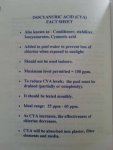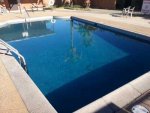If you are worried about metal corrosion, then assuming the light ring is properly connected to the bonding wire (as it should be), then all you need to do is to add a zinc sacrificial anode buried in moist soil and everything on the bond wire should have increased protection from metal corrosion. Most likely it will more than make up for any issues caused by the higher salt level. It's probably not needed, but would add peace of mind of it's of concern.
PH always, constantly drops.
- Thread starter adnedarn
- Start date
You are using an out of date browser. It may not display this or other websites correctly.
You should upgrade or use an alternative browser.
You should upgrade or use an alternative browser.
If I were to entertain that notion and assume there is a bond wire, I just bury that and don't even connect it to the pool or anything?
Pretty sure that last bullet is not true ... 
The rest is fairly accurate although overly simplified. CYA is useful for indoor pools as well for the chlorine buffering effect.

The rest is fairly accurate although overly simplified. CYA is useful for indoor pools as well for the chlorine buffering effect.
The bonding wire should be electrically connected to any metal that is touching the pool water already. It connects the pump, the pool lights, railings, etc. Of course, the wire could be broken, but if it isn't, then adding a zinc sacrificial anode anywhere along the line should protect any metal still connected to that bonding wire. It is not sufficient to just bury the wire itself -- it's the zinc sacrificial anode that puts a net negative charge on the wire that inhibits corrosion (this is also called cathodic protection).adnedarn said:If I were to entertain that notion and assume there is a bond wire, I just bury that and don't even connect it to the pool or anything?
jblizzle I believe you are right. 
chem geek there is a wire connected to the pump, maybe I'll see if I can run a wire from that to the pool and do a continuity test to see if it's connected to other things, that's my best bet I guess.... Although I don't recall any strange single wire being connected to the pump at work.
Thanks all!
Andrew
chem geek there is a wire connected to the pump, maybe I'll see if I can run a wire from that to the pool and do a continuity test to see if it's connected to other things, that's my best bet I guess.... Although I don't recall any strange single wire being connected to the pump at work.
Thanks all!
Andrew
Thread Status
Hello , This thread has been inactive for over 60 days. New postings here are unlikely to be seen or responded to by other members. For better visibility, consider Starting A New Thread.



